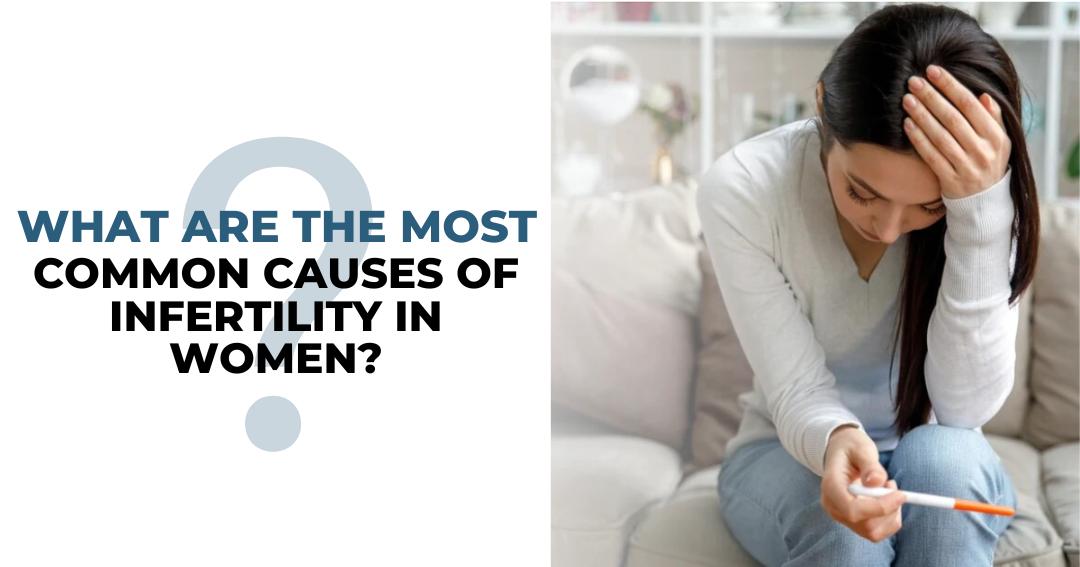Infertility affects millions of women globally, making it challenging for couples to conceive naturally. In many cases, infertility results from issues related to ovulation, hormonal imbalances, or anatomical abnormalities in the reproductive system. By understanding these causes, women can seek timely diagnosis and treatment to improve their chances of conception. Below is a detailed exploration of the most common causes of infertility in women, along with strategies for overcoming them.
1. Ovulation Disorders
Ovulation disorders are one of the leading causes of infertility. Conditions like Polycystic Ovary Syndrome (PCOS) and thyroid dysfunction disrupt the release of eggs from the ovaries. Without regular ovulation, the chances of fertilization are reduced.
- PCOS: Characterized by irregular periods, high androgen levels, and cysts on the ovaries, PCOS can prevent ovulation or make it irregular. This hormonal imbalance also affects egg quality, further complicating fertility.
- Thyroid Disorders: Both hypothyroidism (underactive thyroid) and hyperthyroidism (overactive thyroid) can interfere with hormone levels needed for ovulation.
Treatment: Ovulation induction medications like Clomid or letrozole can help regulate ovulation, improving the likelihood of conception.
2. Blocked Fallopian Tubes
The fallopian tubes are essential for the egg to travel from the ovaries to the uterus. If they become blocked or damaged, fertilization cannot occur naturally. Common causes of blocked fallopian tubes include:
- Pelvic Inflammatory Disease (PID): Often caused by sexually transmitted infections, PID can result in scarring of the reproductive organs, including the fallopian tubes.
- Endometriosis: This condition can lead to scar tissue or adhesions around the fallopian tubes, causing blockages.
- Previous Surgery or Ectopic Pregnancy: Past abdominal or pelvic surgeries and ectopic pregnancies may also damage the fallopian tubes.
Treatment: In some cases, laparoscopic surgery can remove blockages. If the damage is extensive, In Vitro Fertilization (IVF) may be recommended to bypass the fallopian tubes entirely.
3. Endometriosis
Endometriosis occurs when tissue similar to the lining of the uterus grows outside of it, such as on the ovaries, fallopian tubes, or the pelvic cavity. This condition can result in:
- Inflammation: The presence of endometrial-like tissue outside the uterus triggers inflammation, affecting the reproductive organs.
- Adhesions and Scarring: Scar tissue can form between the reproductive organs, hindering egg release and fertilization.
- Reduced Egg Quality: Chronic inflammation associated with endometriosis may also impair egg quality.
Treatment: Women with endometriosis may benefit from fertility treatments such as IVF or surgical removal of adhesions to enhance their chances of conceiving.
4. Uterine Abnormalities
Structural issues within the uterus can interfere with the implantation of an embryo or increase the risk of miscarriage. Common abnormalities include:
- Fibroids: These non-cancerous growths in the uterus can block the fallopian tubes or disrupt the implantation process.
- Polyps: Uterine polyps, small growths in the lining of the uterus, can affect fertility by altering the uterine environment.
- Congenital Abnormalities: Some women are born with a septate uterus (a dividing wall in the uterus), which can lead to miscarriages.
Treatment: Many uterine abnormalities can be treated surgically to improve the chances of conception.
5. Age-Related Decline in Fertility
Age is a significant factor in female fertility. As women age, particularly after the age of 35, both the quantity and quality of eggs decline. This decline makes it more difficult to conceive and increases the risk of miscarriage or chromosomal abnormalities.
- Diminished Ovarian Reserve: The number of eggs in a woman’s ovaries naturally decreases with age, reducing the chances of fertilization.
- Poor Egg Quality: Older eggs are more prone to genetic abnormalities, leading to complications such as miscarriage or Down syndrome.
Treatment: Women facing age-related infertility may benefit from egg freezing at a younger age or fertility treatments like IVF.
6. Hormonal Imbalance
Reproductive hormones such as estrogen, progesterone, follicle-stimulating hormone (FSH), and luteinizing hormone (LH) play critical roles in the menstrual cycle and ovulation. Imbalances in these hormones can prevent regular ovulation or affect the uterine lining, making it difficult for an embryo to implant.
- Premature Ovarian Insufficiency (POI): This condition causes the ovaries to stop functioning properly before the age of 40, leading to early menopause.
- Hyperprolactinemia: Elevated levels of prolactin, a hormone involved in milk production, can suppress ovulation and interfere with fertility.
Treatment: Hormonal imbalances can often be corrected with medications or hormone therapy, improving fertility outcomes.
When to Seek Medical Help
If you’ve been trying to conceive for more than a year (or six months if you’re over 35), it’s important to consult a specialist. A best gynecologist in Jaipur or a gynecologist in Malviya Nagar, Jaipur can help diagnose and treat any underlying fertility issues. Early intervention can improve your chances of conception and reduce the emotional stress associated with infertility.
Conclusion
Infertility in women can have multiple causes, including ovulation disorders, blocked fallopian tubes, endometriosis, uterine abnormalities, age-related decline, and hormonal imbalances. Each condition affects fertility in unique ways, but with proper diagnosis and treatment, many women can achieve their dream of parenthood. If you’re experiencing difficulties with conception, consulting the best gynecologist in Jaipur or best infertility treatment in Jaipur can provide the right guidance and treatment options to improve your fertility.
Dr. Nisha S Mangal (Gynecologist in Jaipur)
Call/WhatsApp: +91-9119134481
Address: C 282, Ground Floor Krishna Guest House
Malviya Nagar, Jaipur, Rajasthan

